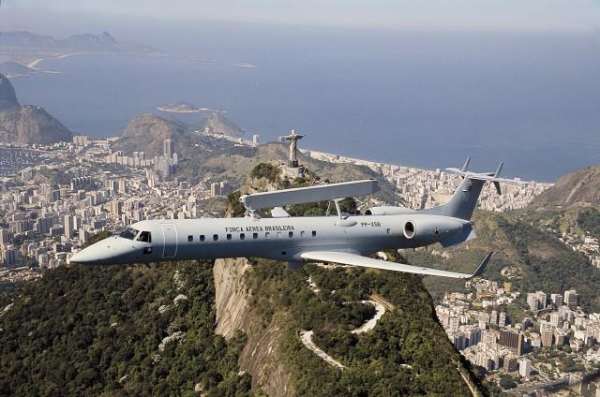Swedish technology for border surveillance in Latin America

To know what is going on around them, Latin American governments need a clear picture of potential threats and illegal activities taking place at sea and in the civilian and military airspace. Detailed and versatile situational awareness, detecting movements at sea and in the air, is key in order to achieve this.
With Airborne Early Warning and Control (AEW&C) solutions, you put surveillance radar antennas on aircraft that fly at high altitudes, which allows you to see much further than with ground-based radar systems on land or sea.
"An early warning aircraft patrolling at some 10,000 metres has a radar horizon way over 400 kilometres away. And our systems can spot objects as small as jet skis", says Bo Torrestedt, President of Saab Latin America.
In use in Latin America
Saab is one of the most widely used AEW&C suppliers in the world, with experience of the challenges found in the Latin American region, with AEW&C systems already in place in Brazil and Mexico. These countries face problems with smuggling and threats to natural resources, such as deforestation and illegal mining. By gathering information and detecting movements in the air and at sea in remote and inaccessible terrain, the authorities can get an overview of the movement patterns of these criminal groups. The presence of the AEW&C also has a preventative effect since the criminals fear being detected.
AEW&C as an asset to society
There are many examples of how Saab’s AEW&C solutions are used in different countries. While the solutions are normally purchased primarily for military use they also have a number of civil applications that can be used in peacetime as well as during times of conflict.
AEW&C solutions can be used in search- and rescue missions to coordinate helicopters or ships ensuring all units have the information they need to perform their tasks. Some countries use them to detect the movements of pirates and smugglers. Others use them to detect and prevent illegal fishing, and to protect economic zones.
"With our AEW&C solutions, one single system can be used for multiple purposes", Torrestedt says. This is in addition to having control of the airspace.
Military applications
Saab’s AEW&C solutions can be used as command- and control centres to support air combat in conflict situations. This allows the user to locate helicopters, sea targets, missiles and aircraft targets at all altitudes. Saab’s AEW&C solutions can be rapidly integrated into an existing military infrastructure due to extensive interoperable voice and data communication, ensuring information superiority by ensuring connectivity across the nation’s all assets. They truly work as force multipliers.
Proven technology
The proven Erieye AEW&C solution is used on a variety of aircraft platforms, including the Saab 2000 aircraft. Saab’s new GlobalEye solution uses the Global 6000 aircraft, providing state-of-the art airborne surveillance.
Countries currently using Saab’s AEW&C solutions include Mexico, Brazil, Greece, Pakistan, Thailand, the United Arab Emirates and Sweden. Among them, they are using a total of more than 20 systems.
GlobalEye
GlobalEye is Saab’s all new AEW&C solution, combining the new Erieye ER (Extended Range), radar and the Global 6000 high-end business jet together with a comprehensive suite of sensors forming a unique multi-sensor solution ready for swing-role missions in the air, - maritime- and ground domains.
Saab 2000 Erieye AEW&C
Saab 2000 Erieye AEW&C is the well proven solution for air and sea surveillance developed over the years using spiral development. It is based on the Saab 2000 turboprop aircraft with very long endurance and high speed, requiring very short fields for take-off and landing.